- Home
- Lloyd Jones
Here at the End of the World We Learn to Dance Page 9
Here at the End of the World We Learn to Dance Read online
Page 9
‘Look. My Pasta has turned red.’
‘No, I haven’t.’
‘I have embarrassed you!’
‘No. No,’ I said. ‘Not at all.’
And just to prove it I presented my cheek for her to kiss. Only for her to leave my face absurdly hanging there.
‘Once is enough,’ she said. ‘More than that is vulgar.’
She was tired from a late night at the restaurant. For most of the crossing she dozed, knees and arms folded in a big leather chair. I went out on deck. It was October, springtime, and the snowcaps along the Kaikouras were sunlit. Other parts of the landscape still wintered in shadow. In the still glassy waters of the Sounds the tourists came out to the sunny decks and fed chips and battered fish to the seagulls. I leant against the railing and smiled indulgently. It felt good to be out in the world again, away from the sweat and sogginess of the kitchen and the closed atmosphere of the room I shared at the hostel with Brice Johns.
When we rolled off the ferry at the other end Rosa insisted on driving. She hunched over the wheel; gripped it too tightly, and drove too slowly for the straight roads that were magnificently empty.
‘Rosa, would you like me to drive?’
‘Why? Why do you ask?’
‘No reason. I just thought you might like a break.’
‘No. I absolutely like to drive.’
She switched her attention back to the road and I slithered down in my seat a bit more. Silence never lasted with Rosa and soon we were talking—about my parent’s farm, where it was exactly, what it looked like. I told her and she looked up at the stark bare hills. ‘It would kill me,’ she said. Her attention drifted back to the road and we entered a new period of silence. Once she glanced at the car clock. She calculated that they would be setting up the tables about now. That cheered her up.
‘Kay. What do you think of her?’ she asked.
What did I think of her? Kay was emotionally thin. While the rest of us might daydream, Kay gave the impression of total devotion to the task at hand. She was the one Rosa turned to in an emergency. It was Kay who whipped off an old tablecloth, pressed on a new one with gleaming cutlery. The whole exercise was done with chilling efficiency. I couldn’t picture Kay outside of La Chacra. I’d heard a husband mentioned; and that he had gone. But that was the sum of my take on Kay. I just couldn’t imagine her with a life of her own.
‘Kay is totally reliable,’ I said.
‘She is on the ball, yes?’
‘Totally.’
I liked these conversations. They put me above the rank and file and suggested a trust in me that I knew Rosa didn’t extend to the rest of the staff. Funny to think that dancing lessons had brought the kitchen and the front of the restaurant together.
‘And what about my dishwasher?’ she asked.
‘Ditto,’ I said.
‘What is this ditto?’
‘It means the same.’
‘Ah,’ she said, and then something in Spanish that clearly amused her.
‘What was that? What was that you just said?’
‘Nothing.’
A bend approached and Rosa turned her concentration back to the road. We were about to enter the gorge.
I’d never travelled in my own country with a foreigner before. I found myself feeling anxious. I desperately wanted Rosa to like what she saw. I assumed she would be filled with admiration and that I would feel understatedly proud. Instead, I began to see it through Rosa’s eyes. It was big, and shadowed, and above all, it was empty.
Once when we stopped for petrol a tour bus on its way south to the glaciers slowed down.You could see the sleepy faces in the window, dulled by landscape. Already they were sick to death of mountains, lakes, rivers and sea. If only someone would run naked across the street! Their eyes picked me up and put me down again.
I wasn’t what they had hoped for.
At the end of the gorge we came out to ocean and sky. Rooftops sparkled in the late-afternoon sunlight. As we entered Louise’s old neighbourhood of Little River, Rosa pointed to the glovebox for her sunglasses. Private driveways tunnelled through thick, bushy hedgerow. At the top of one drive a rust-coloured metal sculpture showed four spindly figures clinging to one another in a storm of cold green light.We passed a few scratchy streets, a war memorial, and a number of grey weathered houses with murky windows. Little River was one of many towns along the Coast that had earned its living from coal and railways. But no longer. The coal seams were exhausted, and the railway that had carried the coal over the Main Divide to the cities was no longer viable. Weeds grew where the road crossed the tracks. Buildings with Greco-Roman columns and pre-war solidity, once tenanted with banks and solicitors, now advertised bingo evenings. Two women in tracksuit pants guarding a cake stall watched us crawl by.
Out the other side of town the bridge took us across an estuary all golden in the fading light. Up ahead were the jagged black tops of the cemetery. We passed it for farmland. As we slowed down again a cow raised its monstrous head to stare at us. ‘Beast,’ Rosa said back at it. We drove on.
This is how the Little River Cemetery declares itself, with a small wooden arrow pointing to dense roadside scrub. Rosa had to brake suddenly. She parked the car and we walked along a short path, parting pig fern and bracken until we reached a section of long grass with raised graves, two with iron bedheads at each end. Rosa fossicked around, parting grass until she found what she was after, which is what she meant to show me, in case I thought she had made everything up. ‘Here,’ she said, crouching down by a river boulder. ‘Read, please.’ I read out the names of James and Kathleen Cunningham.
It wasn’t so interesting, not as interesting as I had hoped it would be. A boulder with a plaque in long grass. But that might have been because I was feeling hungry.
We got back into the car and drove into town. This time there were no false turns. No hesitation at intersections. She drove like a local.
We stopped at a pub to eat, and as I feared would happen, when we entered conversation stopped and faces looked up. Rosa took no notice. It was a younger crowd, some my own age and a little older. Girls in blue track pants. One with a ring through her nose. Another with a nose stud. Some with Chinese symbols tattooed over their arms, or the names of boyfriends branded with ‘forever’ over their flesh. They were the living, breathing flesh of the land, these large, bloated meat-eating figures with heavy breasts swinging under their T-shirts and sweat tops. Their overfed cheeks sagged on heavy jawbones. In this company Rosa looked like a small porcelain doll.
I bought two beers back to our table. As I sat down she hissed, ‘Look at the way these people dress. I shudder to think if I did not provide my waitresses with uniforms. Otherwise, probably they would turn up in rags to wait on tables.’
It was the same taut voice we heard at La Chacra whenever a large party of diners squeezed through the doors. When she left her booth it was like the Captain taking over at the bridge. For her to show her face in the kitchen was a sure sign of trouble out front. Friendships were savagely disregarded. A kind word said a moment earlier was forgotten. In the space of a few minutes we had gone from plain sailing to heavy seas, and everyone was required to pitch in. If I was shining wine glasses then I had to be seen to shine more vigorously. Waitresses, as a matter of unspoken accord, were required to show more breathlessness and distress. Angelo’s voice rose until he was shouting at the char-grilled meat, hissing at it to cook more quickly. Eventually tables were joined, three clean tablecloths found, the cutlery set and the twenty-six unexpected diners seated, and the earlier calm re-established. The waitresses stole out to the loading bay for a cigarette. Angelo stopped shouting at the meat to stare moodily at the grill, and I was left to shine glasses in my own good time. Best of all, Rosa withdrew to her booth of cigarette smoke, and we crossed into the sunset hours of the evening shift.
Here at the pub she pointedly left her cottage pie. She pushed it showily to one side.
I pointe
d out to her, ‘It’s a pub, not a restaurant.’
‘They still have a responsibility to the food. I would not feed this to pigs.’
She looked critically around at the other tables.
‘Look at these people…’ I couldn’t wait to get out of there, away from the frosty stares of the bar help and the locals.
We got back into the car and went off to find the hotel.
At the desk Rosa turned to announce a slight hitch. ‘Well it is not necessarily a problem. They have put us in a double room.’ She announced this in such a public way that I could only agree.
‘No problem.’
The hotel was a big old wooden one with outside fire escapes, wooden banisters, and a steep flight of carpeted stairs that made you feel you were climbing back in time to mustiness and communal bathrooms. On the landing outside our room she apologised. She said, ‘If you are uncomfortable we can change our accommodations.’
‘No, this will be fine.’
She smiled. ‘Thank you, Pasta. I just don’t want you to be uncomfortable.’
‘I’m comfortable.’
‘I hope it is not too disgusting,’ she said, turning the key in the door.
She was pleasantly surprised. There were French prints on one wall. A pouch of pot pourri on the dresser. A stylish bedside lamp. Two beds, I was relieved to see. A double bed and a single which I quickly claimed with my backpack. Rosa looked about for her bag and realised she had left it downstairs. ‘Pasta, would you mind?’
At bedtime, she demonstrated the same flair for direction. ‘Now Pasta, why don’t you use the bathroom to brush your teeth and shower, and I’ll follow after.’ I did as she instructed. On my return Rosa was in black satin pyjamas. It was her turn for the shower. This revolving door saw me in bed by the time she returned, and the awkwardness I was anticipating neatly averted.
In the morning, we once again had the road to ourselves and once more it was slow going. We seemed to occupy the same stretch of road and the same view without any sense of progress.
I said to Rosa, ‘Would you like me to drive?’
‘There is nothing wrong with my driving.’
‘I wasn’t suggesting that there is…’ ‘Then why do you ask?’
Silence.
‘Now you’re pouting.’
‘I’m not.’
‘Yes. Your arms are folded. I know that look,’ she said.
I laughed, which was a mistake.
‘I am also your employer,’ she said quietly. And just like that the hierarchy of La Chacra imposed itself on two people in a car driving along the loneliest coast in the world. Rosa was a proud little nation conscious of its borders and entitlements. Soon though she tired of the silence. She sighed a number of times. Then I felt the car slow down. She was pulling over.
‘Okay. You drive. I cannot stand your pouting.’
‘I’m not pouting,’ I said.
‘Okay, you are not pouting!’
She waited for me to walk round the front of the car and open her door before she would get out.
‘Thank you, Lionel. I remind myself to be patient.’
As soon as she was in the passenger seat she fished around in her bag for her cigarettes. She snatched at the lighter. And when the flame failed she swore in Spanish. She threw the lighter back in her bag. The world was not cooperating today. The view out the window was too still for her, too lacking in stimulation. When a telephone box came in to view she seized on it, sitting up and forward. ‘Here. Stop!’ She said she needed to call up the restaurant.
She left the car door open so I was able to listen in to her conversation with Angelo. Much of it was in Spanish except for words such as ‘mains’, ‘bottles’ and ‘cases’, and the names of various waitresses. Though once when Angelo had some good news to pass on she shrilled back with pleased surprise, ‘Fifty-one shrimp cocktails!’ The rest was in Spanish. I liked the transporting effect her language had on me. As with the tango lessons, it was as though I had crept into a corner of the country that no one else knew about.
Now I heard her make noises of condolence to Angelo. I heard her say, ‘This country…’ accompanied by much head-shaking and sighing. And finally, ‘Ciao, Angelo.’ She hung up and got back in the car, slamming the door. ‘One of your rugby teams came in last night. Two of them vomited up Angelo’s Steak Argentine. Fortunately it was on the pavement outside the restaurant. But of course Angelo is very upset.’
Your rugby team, she had said. Like when she said your country. Your people.
She wound down her window and tossed out her cigarette into my countryside.
I said, ‘You shouldn’t do that.’
‘What? What have I done now?’
‘You threw your cigarette out the window.’
‘Oh, I see. I throw a cigarette out the window and two of your men vomit outside my restaurant. I did not hear you complain of that. I did not hear any apology. And what about Angelo? Have you any regard for his feelings? How he is feeling at the moment.
You know how he prides himself. Have you any thought for what he endures?’
My eyes closed on the road.
‘Yes,’ she said quietly. ‘I know how this country works. One little cigarette for two men’s vomit.’
These days a Department of Conservation sign directs foot traffic through the nikaus to a flax-covered headland. From there a track zigzags down to the beach. Once there you can hear the subterranean shift of beach and rock. Every sound bounces off the towering limestone cliffs. Even when it is perfectly still you can sense the experience of huge seas and solitary days lodged in the sober face of the limestone bluffs.
The heavy shingle slowed us. Rosa, especially. It was as though she were climbing stairs. She kept stopping to empty her sneakers. She waved her hands at the sandflies. She didn’t complain, though. She never said, ‘Your sandflies.’
There were other people out and about. Thanks to cars and the DoC tracks this area of coast isn’t as remote as it was in Louise’s day. Older retired men trudged by with expensive camera gear. A young Japanese couple walked with their arms locked around each other. We approached a boy and girl no older than myself coming the other way. Our eyes sought one another out. As we passed we looked away. I found myself thinking about the girl’s face, how fresh it was, and wishing that Rosa had gone more lightly with the lipstick.
We climbed the point into the next bay and dropped down to the rock pools where Louise had bathed. We walked on. At a midway point I went ahead. Already I could see the cave entrance. I wonder if it isn’t more obvious now than it was in Louise’s day. The stench of urine hung around the entrance. Next to rockband graffiti the names ‘Tosh’ and ‘Liz’ were scrawled inside a large crudely drawn heart.
I waited for Rosa to catch up, then we pushed on through the dark, using the curve of the cave for guidance. Then there was a greyish light and an eyelid view of the ocean.We craned our heads up at the pitched roof. We were in the right cave. This was it; we were there in the story.
To the rear of the cave Rosa began to casually clear sand with the toe of her shoe. Then as she seemed to realise what it was she’d found she got down on all fours to sweep away the sand. I helped her. Once we had exposed the old dance floor we stepped back to admire it. We stepped on to the rock, then, quite naturally, as we might have at a late hour at La Chacra, we began to dance. There were no bold moves. It was more of a shuffle—the kind of thing I imagine Billy Pohl might have favoured. So we shuffled. Slowly. And it was easy because it wasn’t really us at all. For that moment at least we were Louise and Schmidt.
Something like a step or a turn brought our faces closer, and without any fuss or hesitation we kissed on the mouth. Rosa’s lips tasted of cherry, and they were full—the lipstick did not lie. It truly represented the area of her lips. We parted. Rosa smiled. Then she kissed her fingertip and touched my lip, her face broadening to a new warmth. She took my hand and appeared to be dallying with a thought; then she closed
her eyes and pressed my hand against her chest and dragged it slowly down her front. The dumb hand of the shellfish gatherer and the wilfulness of the other.
I might mention here that with Rosa there was never any mistaking her pride when she spoke of her grandfather. When she stood before his photo on the restaurant wall you could see her positioning herself in his history. She was his granddaughter so it was no surprise that the grainy texture of that past should project through her. Once she moved away from the photos, off location as it were, she became herself again, restaurateur, employer, dance instructor, illuminated by lava lamps and nasty brickwork.
In the cave I was witness to another shift as she tried to fit herself in to Louise’s life. Was it in order to see her grandfather more clearly? And was the kiss just a bridge? I wasn’t sure.
My relationship with Rosa already had so many forms and now we’d just created another. As a result of that kiss I was sure I would find the world a changed place. But how to re-enter this world? How would we leave the cave?
In tango it is the man who initiates and the woman who reacts. I should have known that with Rosa established protocol didn’t always prevail, that she would take care to see us out of this moment.
When she had taken my hand she had turned slightly away, her face closed with concentration. There was a rapid breath like the one I had heard from her on the stairs back at the hotel. It was as if she was reaching for something, and then having made contact with it, she gave a contented grunt. Now that she had arrived at that place she had privately wondered about all these years she switched her attention to me. She looked surprised to see me there. ‘Hallo!’ she might have said, as though this was an unexpected encounter in the street, or in a supermarket aisle.
She reached up and gave my cheek a playful squeeze. She grunted. So, we had been playing after all. It was safe to leave the cave now. We were back to restaurateur and dishwasher.
On our way back to the car our sides touched and I remembered the Japanese couple. We walked with the same sort of attachment, slowly and contentedly in the shingle, and in the same direction as Billy Pohl, Henry Graham and Louise when they left the cave.

 Mr Vogel
Mr Vogel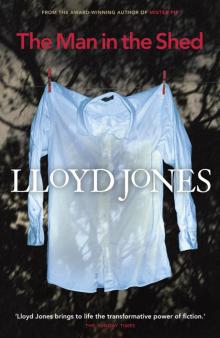 The Man in the Shed
The Man in the Shed Mister Pip
Mister Pip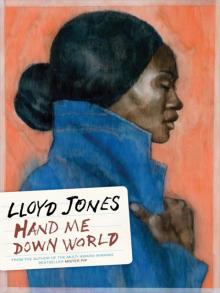 Hand Me Down World
Hand Me Down World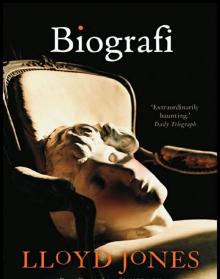 Biografi
Biografi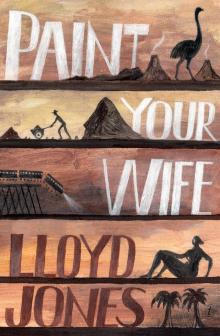 Paint Your Wife
Paint Your Wife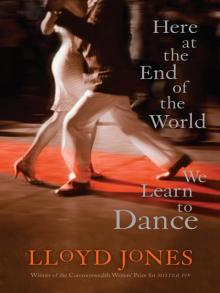 Here at the End of the World We Learn to Dance
Here at the End of the World We Learn to Dance My First Colouring Book
My First Colouring Book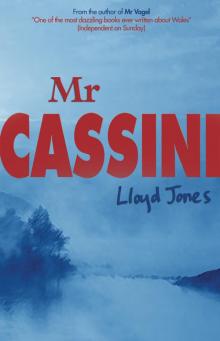 Mr Cassini
Mr Cassini See How They Run
See How They Run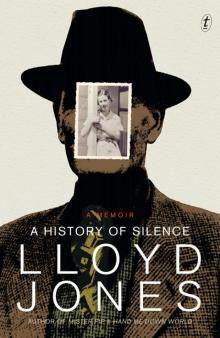 A History of Silence
A History of Silence The Book of Fame
The Book of Fame